Beth Tabler's Blog, page 208
December 15, 2021
Review – Network Effect by Martha Wells
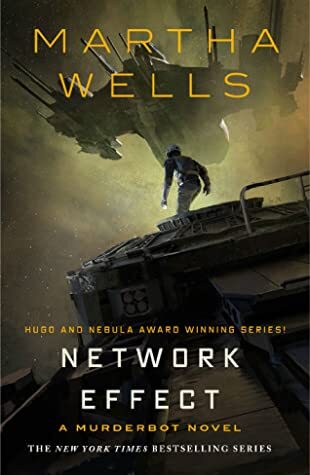 check it out here
check it out here BOOK REVIEW
Network Effect by Martha wells December 15, 2021 10:00 am No Comments Facebook Twitter WordPress “Just remember you’re not alone here.” I never know what to say to that. I am actually alone in my head, and that’s where 90 plus percent of my problems are.”If there’s one thing in the world that will remain complex no matter what, it’s our identity. It can be fragmentary, just like it can be unambiguous. It can be consistent through time, just like it can evolve through experience. But what does it mean to be human? Can our identity be split between body and mind? Matter and consciousness? For one Murderbot, the question remains a mystery, a mystery that complicates its wish to live an uninterrupted and peaceful life filled with soap operas and good old quiet time.
At least with each adventure, it slowly learns the intricacies of being human and its own identity in the grand scheme of things. And so, rejoice, fellow Murderbot fans, as the fifth entry in writer Martha Wells’ franchise is the first full-length novel and, unfortunately for this sophisticated being, trouble continues to follow the humans around it and it will have to find new ways to protect them, wherever that leads it.
What is Network Effect about? Picking up where things were left off in Exit Strategy, Murderbot finally embraces peace as it’s welcomed amidst Dr. Mensah’s family and social circle, patiently waiting for its new mission. Not too long after acquainting her family, especially her daughter Amena, Murderbot is tasked to accompany a team on a survey expedition and nothing could’ve prepared them for the intergalactic kidnapping they are about to take part in.
Things couldn’t get more suspicious until they also run into an old associate of Murderbot that doesn’t seem to be responding as usual. While Murderbot would’ve loved to be spared all this trouble, it is forced to take action and to find a way to keep these silly humans alive while also lending a hand to someone from its past life, whether it wants to or not.
“I hate emotions.”
— Martha Wells
Was going full-length instead of a novella-length detrimental to this Murderbot’s legacy? Hell no. Anyone who has returned for more of its shenanigans will get just that, if not more of its snarky, cynical, and despairing self. Action-packed from start to finish, with a bit more world-building and character development, writer Martha Well fully explores her protagonist’s transformation and self-realization, allowing readers to further grasp its torment in regards to its resentment towards its ability to feel, like humans. To make matters even more terrifying for this Murderbot, its organic parts continue to irk it beyond understanding, making it want to kill itself when there’s anything remotely related to leaking and bleeding.
While this sentient murder machine initially programmed for destruction continues to discover the hidden component of its mind, and the complex nature of human beings, it is also confronted with the concept of relationship. Through its new bond with Dr. Mensah’s daughter, it uncovers the role of authority and motherhood.
Through its old bond with its past friend, they share an old couple’s dynamic, disguising their care for each other with grumpiness and constant remarks towards one another. These multiple relationships allow Murderbot to further complexify its own algorithms and better understand what it is becoming.
Of course, there’s no shortness of action to keep it engaged from start to finish. This is what allows its stories to be relentless, constantly entertaining, and engaging. Its complete thought processes are shared through its omniscient narration, spelling out all of the options at hand or the procedure that it will complete to achieve its goals.
This allows Murderbot to display its personality without any filter, sharing its despair whenever the situation derails. Whether its actions require a split second or a whole minute, it is through this intimate journaling of its adventure that readers continue to be attached to this Murderbot and its endearing yet cynical ways.
Please check Out Bookidote’s original review Here LashaanNetwork Effect is a thrilling and engaging full-length novel in the Murderbot saga that continues to explore one nonhuman’s very human experiences.

They call him Lashaan. A reader. A reviewer. A researcher. He’s a Ph.D. candidate in criminology and works full-time in a North American police organization. He has an eclectic reading taste but primarily focuses on science-fiction, fantasy, and graphic novels. He might seem busy by day, but he chases after stories, whatever form they are in, by night.
Check Out some of our other reviewsDecember 14, 2021
Review – Come Tumbling Down by Seanan McGuire


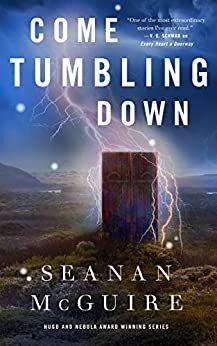 check it out here
check it out here BOOK REVIEW
come tumbing down by Seanan McGuire December 14, 2021 10:00 am No Comments Facebook Twitter WordPressCome Tumbling Down, Seanan Mcguire’s fifth installment in the Wayward Children series, follows the adventures of the delightfully macabre and grisly Wolcott twins. Jack, the mad scientist, sufferer of OCD, and generally quirky misanthrope, and Jill, Jack’s twin, is cruel, beautiful, and wants nothing more than becoming a vampire. Jack returns to the school via a door made of lightning, literally carrying her love in her arms.
Jack is trapped in the body of Jill, and although Jill is virtually identical to Jack physically, Jill has done horrible things that have soiled her very essence. Jack is a sufferer of OCD and desperately needs her body back to salvage her sanity. She requests the aid of former classmates in a quest, disobeying the no quest rule, to get something of great her body back from Jill and save Jill, even if it means saving her from herself.
The Moors, the twin’s world they have come to love, is a place of darkness, monsters, mad science, and unforgiving fierce creatures. It is a place where gods are drowned, the moon has power, and lightning fuels the world, and it is a place where Jack feels most like herself and a home where she wants to stay.
But first, Jack and friends Kade, Sumi, Cristopher, and Cora must help Jack stay sane and save this dark and macabre world. But, who knows who the monsters are? The line between good and evil or Monster and savior can be blurry. It depends entirely on which side you are standing on.
“The world doesn’t stop spinning because you’re sad, and that’s good; if it did, people would go around breaking hearts like they were sheets of maple sugar, just to keep the world exactly where it is. They’d make it out like it was a good thing, a few crying children in exchange for a peace that never falters or fades. We can be sad and we can be hurt and we can even be killed, but the world keeps turning, and the things we’re supposed to do keep needing to be done.”
― Seanan McGuire, Come Tumbling Down
Again, McGuire delights and intrigues with the darkly rich world she has created in the Wayward Children series. Each installment has a message or idea that can be gleaned from the pages without preaching.
In this installment, McGuire touches on the sense of self and not being at home in one’s own body. Your body on the outside does not necessarily match who you are on the inside. It is an important message, and McGuire treats the subject delicately and with immense care.
McGuire has written another beautiful and meaningful story with Come Tumbling Down. It will delight and maybe shock a bit. And, when you get done reading it, you might think twice about who is a monster and who is not.
Check Out some of our other reviewsReview – The Final Girl Support Group by Grady Hendrix
December 13, 2021
2021 Hugo Art Review – Tommy Arnold
 stories in photos
stories in photos 
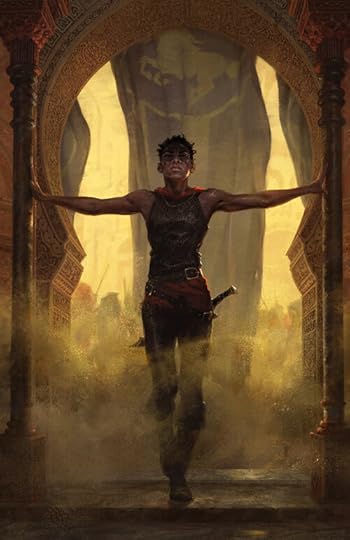




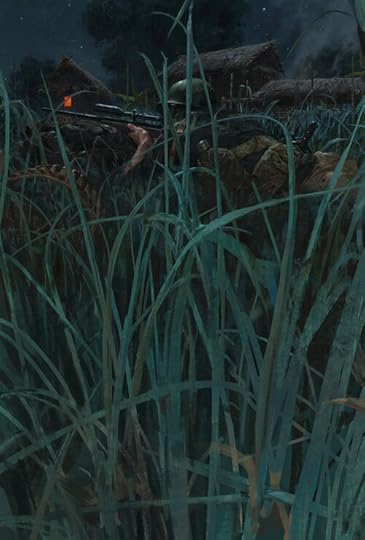


 Previous Next Contact /
Previous Next Contact /tommyarnoldinfo(at)gmail.com *
*Please note: Continuing to bring you the best work I’m capable of is my highest priority, and requires a lot of focused time in the studio. For that reason, I check email only once per week. I respond to all work inquiries, but unfortunately outside of that I have to respond rather selectively, if at all.
For the same reasons, I’m currently unable to sign Magic cards, remarque books, or do anything else through the mail. Thank you for your understanding!
About /Artist | science-fiction + fantasy.
Selected Clients /Ace Books · Del Rey Books · Grim Oak Press · Illumicrate · Orbit Books · Saga Press · Subterranean Press · Tor Books · Tor.com · Tor.com Publishing · Valve Software · Wizards of the Coast
Selected Press + Recognition /Communication Arts 8-Page Feature – July/August 2018
Juried Annuals
Illustrators – 57, 60, 62, 64
Spectrum – 23, 24, 25, 26, 27
Awards
Hugo Nominee, Best Professional Artist – 2020, 2021
Chesley Award Nominee – 2017, 2018, 2019, 2020, 2021
The Jack Gaughan Award from NESFA – 2016
Social Media /To make sure you stay informed of time-limited print releases, I suggest my Mailing List.
To access behind-the-scenes illustration content (my sketches, drawings, step-by-step process tutorials, and full-size PSDs of my artwork) visit me on Patreon.
For more information please visit Tommy Arnold’s website. All images are the property of Tommy Arnold.
Check Out Some of Our Other ArticlesReview -; Piranesi by Susanna Clarke
2021 Hugo Art Review – Rovina Cai
Review – Piranesi by Susanna Clarke
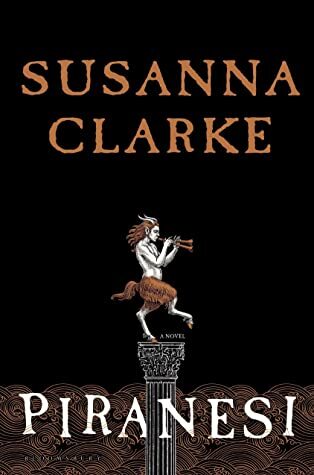 check it out here
check it out here BOOK REVIEW
piranesi by Susanna Clarke December 13, 2021 10:00 am No Comments Facebook Twitter WordPress “The Beauty of the House is immeasurable; its Kindness infinite.”Bizarre and beautiful, Piranesi is unlike anything I’ve ever read. Author Susana Clarke crafts an unforgettable tale of solitude, loss, and finding oneself in unexpected ways. While it was difficult to predict where the story was going (or indeed, where it started), I was swept away by it, and happily wandered the corridors of this labyrinthine book.
Piranesi has always lived in the House. At least, he thinks so. In a flooded place filled with statues, birds, and the ever-present tides, he is mostly content. However, he is alone, aside from the Other. The Other is a mysterious figure whom Piranesi has agreed to look for a Great Knowledge with. What follows this simple premise is something new and entirely unique.
I can’t tell you much about the plot because I’m honestly still going through things in my mind. I would say that it’s convoluted, but the opposite is true. There are very few answers given throughout the book, making my imagination work overtime to fill in gaps in the narrative. Who is Piranesi? Who is the Other? What and where is the House?
As with the rest of Piranesi, the people are intentionally vague. A picture unfolds slowly, and little details are fleshed out, revealing amazingly deep characters. I honestly have no idea how Susanna Clarke was able to bring so much to life with so few words. The book is told almost entirely through journal entries, so physical descriptions of the characters were understandably few and far between. Normally that would really irk me, but I found that a character’s physical description matters much less in Piranesi than in other books I’ve read.
In a complete turnabout from the characters, there was plethora of descriptions surrounding the House. It was done so well that I’m still half-convinced I’ve been there. I could hear the birds’ wings. I could smell the salt water. I could feel bits of seaweed in between my toes. It was astounding. To read this book is to become fully immersed in a different, introspective world.
It is absolutely impossible for me to compare this book to any other, including the author’s previous book. It sands alone and, while it won’t be everyone’s cup of tea, I’m planning to revisit it soon. I highly recommend Piranesi to to readers who appreciate beautiful prose, who like open-ended books, and who want to be swept away.
Check Out some of our other reviewsReview – The Final Girl Support Group by Grady Hendrix
Jodie Crump
Jodie Crump is the creator of the Witty and Sarcastic Bookclub blog. She either lives in Florida with her husband and sons, or in a fantasy book-she’ll never tell which.
When she’s not reading, Jodie balances her time between homeschooling her hooligans, playing Dungeons and Dragons, and lamenting her inability to pronounce “lozenge”. Find her online at Witty and Sarcastic Book Club or Twitter
December 12, 2021
Review – Upright Women Wanted by Sarah Gailey

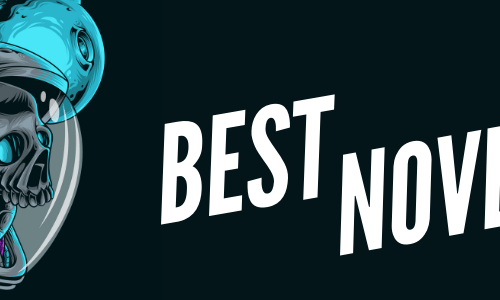 Review Book Reviews December 12, 2021 11:00 am 4 Comments A Wonderful Queer Western With Moxie
Review Book Reviews December 12, 2021 11:00 am 4 Comments A Wonderful Queer Western With Moxie  Beth Tabler 4/5
Beth Tabler 4/5 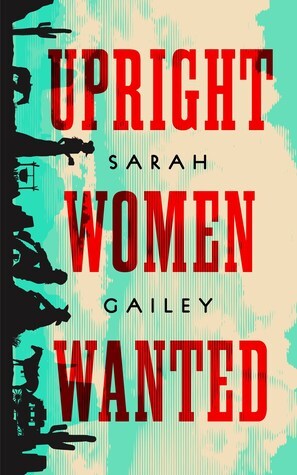 upright women wanted by Sarah Gailey Purchase Here
upright women wanted by Sarah Gailey Purchase Here Sarah Gailey, Upright Women Wanted About
“Not the question Cye had asked—do you believe everything you read?—
but the question they hadn’t asked: why do you believe everything you read?”―
In Upright Women Wanted, award-winning author Sarah Gailey reinvents the pulp Western with an explicitly antifascist, near-future story of queer identity.
“That girl’s got more wrong notions than a barn owl’s got mean looks.”
Esther is a stowaway. She’s hidden herself away in the Librarian’s book wagon in an attempt to escape the marriage her father has arranged for her–a marriage to the man who was previously engaged to her best friend. Her best friend who she was in love with. Her best friend who was just executed for possession of resistance propaganda.
The future American Southwest is full of bandits, fascists, and queer librarian spies on horseback trying to do the right thing.
Upright Women Wanted by Sarah Gailey is a queer western with dystopian roots and a whole lot of moxie.
“She wanted that satisfaction. She wanted it for herself wanted it like a half-starved alley-rat watching that table through a window on a bellyaching night. She didn’t know how to get it—but she had a feeling that if she stuck with the Librarians for long enough, she might be able to figure it out.
How to feast instead of starving. How to like the person who she was instead of fighting it.”
In this future, the State, in combination with religious fanaticism, controls everything you listen to, what you eat, and who you love. Our protagonist, Esther, is the daughter of a high-ranking official who is fleeing her home. Esther’s life was thrown into turmoil when her best friend and lover was hung in front of the town for owning unapproved reading materials. She hides in the back of a wagon of a Librarian with hopes of joining their group. A Librarian travels and provides approved reading materials to the townsfolk of the various frontier communities in their area. Esther hopes for a better life and to be cured of her’ wrongness.”
What Esther finds is a group of people who are accepting and very much themselves. They are people who have to hide from the State but in secret live in queer relationships or live as non-binary individuals. Things that Esther did not think even possible.
“When there’s people around that we don’t trust, we let them think we’re the kinds of people who are allowed to exist. And the only kind of Librarian that’s allowed to exist is one who answers to she.”
Upright Women Wanted is a novella-length story, so author Sarah Gailey had to condense a lot of story, nuance, and world-building into few pages. For the most part, Gailey is very successful. They created an engaging story, highlighting critical societal problems that play a pivotal role in the plot and character development.
The story is too short to provide you with a backstory on the librarians, though, which I badly wanted considering the depth of character their few lines had and how impactful they are.
Bet and Leda are a queer couple in a solid long-term relationship, Cye is non-binary, and Amity rounds out the group but remains a mystery. Gailey could write a full-length novel in this world, and I am here for it. Esther is a good character also and is the most developed, but the other librarians stole the show.
The conflict of the story, aside from Esther’s initial reason for running, is the Damocles hovering over the group from being discovered. If they are found, the consequences will be dire. Instead, the group of librarians works to subvert the system from the inside. From there, the narrative plays out a bit with the Librarians dealing with skirmishes and problems in their line of work.
Upright Women Wanted is a clever book. Clever in wordplay, as in “what is an upright woman? But also creative in style and characterization. Gailey gets what it takes to create an engaging novella, just enough of a story bite that gets the readers hooked, and just enough back story and world-building to understand the setting. It is well done. I loved the characters, and it allows me to use the underutilized word like moxie. Them folks are full of all sorts of moxie, and I loved reading it.
Check Out My Other ReviewsReview – Battle Ground by Jim Butcher (Dresden Files #17)
Review – The Ikessar Falcon by K.S Villoso
If You Liked This - Please Share the Love Beth Tabler
Elizabeth Tabler runs Beforewegoblog and is constantly immersed in fantasy stories. She was at one time an architect but divides her time now between her family in Portland, Oregon, and as many book worlds as she can get her hands on. She is also a huge fan of Self Published fantasy and is on Team Qwillery as a judge for SPFBO5. You will find her with a coffee in one hand and her iPad in the other. Find her on: Goodreads / Instagram / Pinterest / Twitter
2021 Hugo Art Review – Rovina Cai
 stories in photos
stories in photos Rovina Cai is a freelance illustrator from Australia. “I love creating haunting, poetic imagery, and believe that one of the most valuable things an illustrator can offer is their unique and personal perspective. I have meticulously crafted my distinctive style to reflect this.
Clients I’ve had the pleasure of working with include; Tor.com, The Folio Society, DC Comics, Hasbro, and many more publishers. My work has been recognised by organisations like the Society of Illustrators, Spectrum Fantastic Art, and the Children’s Book Council of Australia.
I’m always up for a challenge, and enjoy collaborating on interesting projects no matter the application, so please do get in touch!(link)”

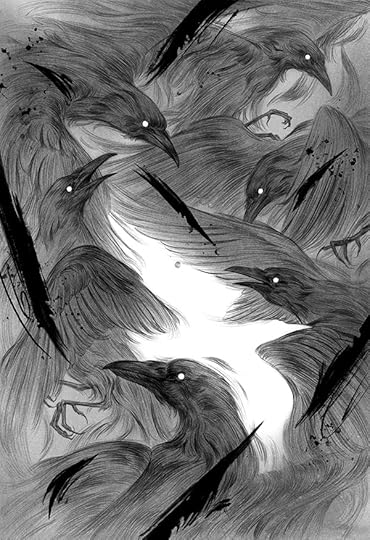




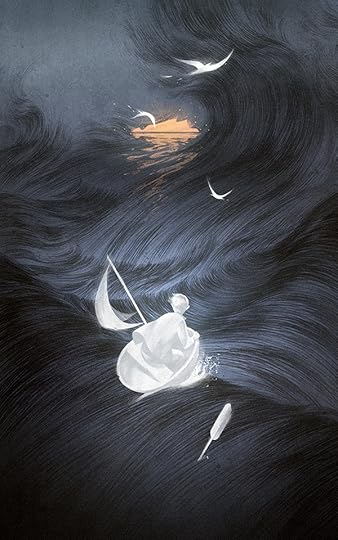 Previous Next
Previous Next For more information please visit Rovina Cai’s website. All images are the property of Rovina Cai.
© 2021 All Rights Reserved.
Facebook-f TwitterDecember 11, 2021
2021 Hugo Art Review – Galen Dara
 stories in photos
stories in photos Galen Dara Likes Monsters, mystics, and dead things and extremely ripe apricots. She won the 2016 World Fantasy Award for best Artist and has been nominated for aHugo Award, the Lotus award and the Chelsey Award.
Contact her at galendara@gmail.com
Please check out her website and find out more about them.








 Previous Next
Previous Next For more information please visit Galen Dara’s website. All images are the property of Galen Dara.
Check Out Some of Our other PagesReview of;Blue Is the Warmest by Julie Maroh, Ivanka Hahnenberger (Translator)
Hugo Art Review – Alyssa Winans
© 2021 All Rights Reserved.
Facebook-f TwitterInterview With Author Ken Liu
 "Absolutely! The Dandelion Dynasty is a four-volume silkpunk epic fantasy series that took up the bulk of my time and creative energy over a ten-year period. The Veiled Throne, as you note, is the third volume. While writing the series, I learned a lot about myself as a writer, as a father, as a husband, as a grandchild, as a technologist, as a lawyer, and as a person."
"Absolutely! The Dandelion Dynasty is a four-volume silkpunk epic fantasy series that took up the bulk of my time and creative energy over a ten-year period. The Veiled Throne, as you note, is the third volume. While writing the series, I learned a lot about myself as a writer, as a father, as a husband, as a grandchild, as a technologist, as a lawyer, and as a person." Ken Liu is an author of both long and short-form speculative fiction; his short story collections The Paper Menagerie and Other Stories and The Hidden Girl and Other Stories each won Locus awards for best collections. And his silkpunk epic fantasy series, The Dandelion Dynasty, won a Nebula, Hugo, and World Fantasy Award. Aside from being a prolific writer, Liu has worked as a translator, software engineer, and lawyer.
I had the great honor of chatting with Liu about some of his approaches to story creation, and how technology, law, and software creation overlap, as well as his epic series The Dandelion Dynasty.
[GdM] I read an article where you said, “Tech, law and publishing might seem like three unrelated careers, but…all three jobs required symbolic systems to construct “machines” that achieved specific results. (link)” Could you elaborate on how these three spheres of thought are similar and how they diverge?

[KL] First, it’s a pleasure to talk to you and your readers. Thank you.
As a programmer, a lawyer, and an author, I’m always writing, for machines and also for people. In each case, I’m constructing machines out of symbols that solve specific problems, and they do this by making use of rules in different systems. In a program, these are the rules of computation in a universal Turing Machine. In a contract or brief, these are the legal rules of the particular jurisdiction as well as the rules of interpretation and enforcement followed by authorities in that jurisdiction. In a story or novel, these are the set of grammars and interpretive frameworks, unique to every reading community, that readers deploy to bring the words on the page to life.
Constructing machines is, of course, the bread and butter of engineering. And the aesthetics of craft are similar in every case. Much advice about programming—balance, structure, clarity of expression, self-documenting code, the preference for simplicity, functional design, striving to do more with less, know the language and the toolset—would apply just as well to legal drafting or fiction writing.
However, there is much more predictability and certainty at one end, when you’re writing for machines and abstract mathematical constructs, versus the other end, when you’re writing for people with individual life experiences, expectations, blind spots and insights, biases and hopes, that all inform each reader’s sui generis mind. In a very real sense, the story that the author leaves on the page is incomplete, for the reader must perform her half of the dance to animate the words with her unique view of life and finish the story. Authors must eventually accept that fiction is about giving up control, and stories only work when there is a bond of resonance between the reader and the writer. The more I write, the more I treasure that bond, which is so hard to find and maintain. It’s a miracle that any stories are understood at all.
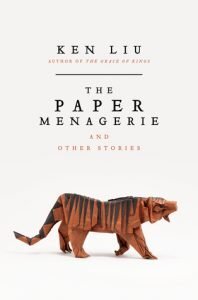 [GdM] When talking about using symbolic systems for your chosen professions, would it be fair to say that there is also an implied importance in the specificity of word choice? Words themselves have power, especially in fields like computer engineering, law, and English. Does this specificity flow into your stories? Do you search for the perfect words to convey an idea?
[GdM] When talking about using symbolic systems for your chosen professions, would it be fair to say that there is also an implied importance in the specificity of word choice? Words themselves have power, especially in fields like computer engineering, law, and English. Does this specificity flow into your stories? Do you search for the perfect words to convey an idea?
[KL] Writers are always on the search for not just the perfect word, but also the perfect phrase, sentence, grammatical structure, rhetorical device … indeed, often to search is not enough, for what they want, need, crave doesn’t even exist, and they must invent it.
Milton did not write in some nondescript, generic tongue called “Early Modern English.” He had to invent his language suited to the task of justifying the ways of God to men: bending the vernacular to fit the syntax of Latin; blending allusions ancient and modern, biblical and scientific; seducing the reader into sin with classical rhetorical tropes before thundering them awake with Puritanical rage. Dickinson did not write in some idealized, bland grapholect called “19th-century American English.” She had to invent her language suited to portraying the vastness of existence in the dance of a single Bee and a single Clover, where each dash, each Capital Letter, each lilting enjambment – so musical and yet so contrary to a song! – is a moment of joy seized from gossamer Death.
Think of the writers you admire: Spencer, Nabokov, Lu Xun, Hughes, Le Guin, Faulkner, Stein, Woolf, Dillard, Sontag, McCarthy, Morrison – none of them bothered to write in the smooth, effortless language of everyday life, of business and instruction, of convention and cliché. Writers with something to say and worth reading don’t settle. They all searched and searched for the perfect language suited to what they had to say and, failing to find it, invented their own tongues. To read them, one must learn their idiolects; it is the only way to see the world they saw.
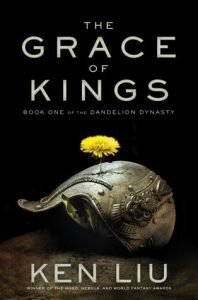 [GdM] You are both a prolific short story author and a long-form novelist. Each of the two forms requires a different headspace, a different way to construct stories. Between the two forms of storytelling, which do you feel most at home in? Or are they so different that it is hard to compare them?
[GdM] You are both a prolific short story author and a long-form novelist. Each of the two forms requires a different headspace, a different way to construct stories. Between the two forms of storytelling, which do you feel most at home in? Or are they so different that it is hard to compare them?
[KL] As you note, short fiction works completely differently from novels. Short stories are like insects, while novels are more like elephants. They don’t just differ as a matter of size—they have completely different body plans and physiologies, uniquely suited to the scale of the universe they must function in.
I’ve always enjoyed writing short fiction, but I write very few short stories (maybe a few a year). Almost everyone I know writes faster and more than I do, but because I published many of my stories, written over a long period of time, in a relatively short span early on, the illusion that I’m prolific persists.
I also write very few novels—really, only one: the Dandelion Dynasty series (which is like one very long book). But I’m lucky that my one novel is also the piece of fiction I’m proudest of. In it, I think I come closest to the language I need to tell the stories I want to tell.
[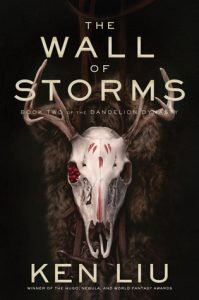 GdM] What was your inspiration for the short story, The Paper Menagerie, that won Nebula, Hugo, and World Fantasy Awards? While I don’t have the same frame of reference as the characters in the story, the problems and interactions feels relatable. The magical parts of the story seems like a perfect extension of the relationship between the mother and son.
GdM] What was your inspiration for the short story, The Paper Menagerie, that won Nebula, Hugo, and World Fantasy Awards? While I don’t have the same frame of reference as the characters in the story, the problems and interactions feels relatable. The magical parts of the story seems like a perfect extension of the relationship between the mother and son.
[KL] I wrote “The Paper Menagerie” originally for an anthology on wizards (spoiler: it didn’t get in). I wanted to come up with a different take on magic users than conventional ones, and at the time I was reading some personal narratives by women who are often described as “mail-order brides.” The courage and strength and resilience of these women moved me greatly, and so I decided to write a magic realist story inspired by their stories.
The themes of “The Paper Menagerie” are universal. Like the mother, we are all migrants from one life to another, whether it’s literal migration across political borders, or simply growing up and taking on new roles that you didn’t have before, and we must figure out how to be who we are while everyone else is telling us who we should be. Like the son, we all must deal with labels and prejudices others impose on us, and to struggle against self-hatred, to resist the cowardly desire to conform, to realize that our parents also have their own stories, to find how to fit our own story into all the stories out there, to grow in wisdom and strength until we are worthy of the love we’re given.
But “The Paper Menagerie” has also been misread. It’s a story about systemic racism and internalized racism, and how we don’t reflect enough on these issues and don’t stand up to hatred. However, I’ve often seen summaries of the story describe it as being about “an American father and Chinese mother, and their son, who is caught in the middle of their cultural conflict.” This is utter nonsense. Both the mother and the father are American – to deny that the mother is American is to implicitly equate Americanness with whiteness and to marginalize the American experience of immigrants, a core part of the American story. The son isn’t caught “in the middle” of anything. There is no “cultural conflict” here (which is a trope that comes from the racialized “clash of civilizations” narrative of colonial discourse), but pure and simple racism. Each time I see that the story is read to conform to the meta-narrative of systemic racism, I also hope that it’s an opportunity for readers to break free of the meta-narrative and see the story the way it’s meant to be seen.
[GdM] One of the things I appreciate about your short story writing is taking a metaphorical idea and boiling it down into a story that we readers can understand contextually. Is that a subconscious thing, or do you find a concept that moves you and write a story around it?
[KL] I think of my preferred mode of crafting short stories as “literalizing metaphors.” The world in my story is just a few steps to the side of ours, where some concept that we speak of metaphorically is literally true. We speak of love making the world coming alive, so in my story “The Paper Menagerie” love literally animates the paper animals. We speak of technology as magical, so in my story “Good Hunting” magic is literally and gradually replaced by technology. We speak of reading the book of nature, of writing shaping the way we think, of the orality of Internet discourse … so in my story “The Bookmaking Habits of Select Species” all of these metaphors about reading and writing become literally true.
When a metaphor is made tangible and real, there are ways to play with it and interrogate it that are simply impossible when the idea is merely a metaphor. The literalization can be done through a fantasy or science fictional lens (or any other genre), which is why I don’t care much about genre labels. Ultimately, it’s the specifics of what I can do with the literalized metaphor that interests me, not the broad framework through which that literalization takes place.
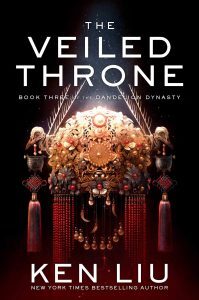 [GdM] You are releasing book three of The Dandelion Dynasty called The Veiled Throne
. Could you tell us a bit about The Dandelion Dynasty in general for people who have not gotten the pleasure of reading it yet?
[GdM] You are releasing book three of The Dandelion Dynasty called The Veiled Throne
. Could you tell us a bit about The Dandelion Dynasty in general for people who have not gotten the pleasure of reading it yet?
[KL] Absolutely! The Dandelion Dynasty is a four-volume silkpunk epic fantasy series that took up the bulk of my time and creative energy over a ten-year period. The Veiled Throne, as you note, is the third volume. While writing the series, I learned a lot about myself as a writer, as a father, as a husband, as a grandchild, as a technologist, as a lawyer, and as a person. I can’t wait to take a new reader from the opening lines of this book all the way to the final period after the last sentence in Speaking Bones.
A preliminary note: I invented the term “silkpunk” specifically to describe the aesthetic in the Dandelion Dynasty series. (Other authors have used my term to describe their own books, and I won’t be talking about their uses. My only concern here is my definition, for my aesthetic.)
In creating the silkpunk aesthetic, I was influenced by the ideas of W. Brian Arthur, who articulates a vision of technology as language. The task of the engineer is much like that of a poet in that the engineer must creatively combine existing components to solve novel problems, thereby devising artifacts that are new expressions in the technical language. In creating the silkpunk aesthetic, I was influenced by the ideas of W. Brian Arthur, who articulates a vision of technology as language. The task of the engineer is much like that of a poet in that the engineer must creatively combine existing components to solve novel problems, thereby devising artifacts that are new expressions in the technical language.
It is not “Asian steampunk.” It is not “Asian fantasy.”
The “punk” part is also not a worn suffix devoid of content. To me, silkpunk is about a key punk project: re-purposing what was for what will be. These books are my rewriting of the narrative of modernity (and in the later books in particular, the modern American national narrative). This is a vision of modernity no longer exclusively centered on what we think of as the “Western” experience. Rather, it melds multiple traditions and myths important to me, from the Iliad to Beowulf, from Paradise Lost to wuxia, and transforms the Chu-Han Contention into the foundational political mythology of a brand-new, modern people.
Why did I do this? Well, a driving impetus behind this series is my desire to challenge and interrogate the conventional narrative of modernity, which is often modeled on a particular telling of the story of my country, the US of A. The Story of America is most often told using allusions to Western models such as Classical Rome (just think of how many aspects of American politics and national culture evoke images of America as a “New Rome”). But when you are constrained to one set of allusions, there’s a limit how much you can push readers to see something new in a familiar tale or, even bolder, to change the narrative.
Something radical had to be done. I decided to depart from the “New Rome” model and instead evoke East Asian models in this fantasy epic recasting of the Story of America — and by extension, the narrative of modernity. Thus, I borrowed much of the plot of The Grace of Kings, the first book from the Chu-Han Contention, as interpreted by the historian Sima Qian, and built up a vocabulary of non-Western political allusions and precedents that could then be drawn on in the re-imagining of the epic of modernity.
Starting with the second book, The Wall of Storms, and then even more so in the third book, The Veiled Throne, all that effort pays off. The story here is about the creation of the constitution for a new people (a constitution, in my view, is not a document, but a set of stories that form the core of a people’s self-perception, self-regard, and deepest values). The plot here no longer has a clear, specific historic analog. (Thus, identifying the people of Dara as “fantasy Chinese” or the Lyucu as “fantasy Mongols” or any people in these books as “fantasy [fill in the blank group]” would be very much misguided.) Rather, the central concern of the Dandelion Dynasty is a series of questions: How can a new nation built from a collection of diverse peoples compose a new constitution, agree on a new source of political legitimacy, rally around a new foundational mythology? How do we carry out a political experiment to build a more just society without creating more injustice? What weight should be given to the wisdom of tradition by revolutionaries? Is it a curse or a blessing that a new generation must contend with the weight of history they are born into and live with the decisions made by their forebears? Is a “perpetual revolution” desirable or even possible? …
If these seem to draw on my experience as a lawyer, then the next set of themes are based on my life as a technologist. The Dandelion Dynasty is also a series about science and discovery: it’s epic fantasy with a heavy dose of scifi—I mean, one of the characters literally proclaims, “the universe is knowable,” a manifesto of the scientific view of the cosmos. I had some of my best writing moments in the discovery of the silkmotic force and the invention of the machines derived from its power. Many of the discoveries and inventions in the series are drawn from antecedents in China’s classical past; some are based on the work of ancient Greeks; some are modeled on the experiments of Ben Franklin; and still others are simply cut by me out of whole cloth. Being a technologist by trade, I love writing about discovery and innovation—and I’m pretty sure my readers enjoy reading about them too.
Before we go too far down these philosophical routes, however, I should note that it would be just as accurate to say that The Dandelion Dynasty is about young people flirting and partying and being silly and awesome garinafin-vs-airship set pieces and devious battle tactics—derived from history, to be sure, but also from the author’s experience in playing video games and watching football—and legalistic dirty tricks and deconstructionist mis-readings and fantastic engines constructed from silk and bamboo and giant capacitors humming with the power of lightning … I mean, sure, themes are important, but books always need fun.
I wrote the book because I had things I wanted to say and I wanted to have fun. Those are the only two good reasons to write a novel as far as I’m concerned.
[GdM] You have a motif about flowers throughout the novels, specifically the chrysanthemum and the dandelion. What made you choose these two flowers, and how does the love and preservation of certain flowers become a political act?
[KL] Without spoiling the story, let me just say that floral metaphors and motifs are core to all the books in the series. Often, the way I use flowers in the books is contrary to convention. They are not so much symbols of beauty as symbols of strength and resilience, and the flowers I celebrate are not necessarily the “noble” flowers, but the “hundred flowers” that often get dismissed as weeds.
Those who don’t read much contemporary fantasy may have an impression that epic fantasy is devoted to nostalgia for what never was, to an authoritarian view of politics as best geared towards the return of the rightful king. But that is hardly an accurate view of the epic fantasy from the best writers of today, such as Kate Elliott and Rebecca Roanhorse. The Dandelion Dynasty is also an epic about modernity and constitutionalism, about freedom and democratic ideals, and metaphors about flowers play a key role in literalizing these concepts.
[GdM] It is safe to say that there are many examples of Daoism in your work. Could you speak a bit about that and how it influences your writing? The interview I read spoke specifically about The Legends of Luke Skywalker story you wrote and how George Lucas used a lot of Eastern philosophy to create The Force.
[KL] I think it’s more accurate to say that I’m influenced by three separate yet related philosophical traditions: Daoism, Zen Buddhism, and American Transcendentalism. I wouldn’t say anything I write is specifically an instance of Daoism, for Dao is a concept that resists being pinned down and literalized as a metaphor. I do, however, find much appealing in the Daoist’s utter contempt for our general obsession with language, with tracks and traces left by Reality as opposed to Reality itself.
The American Transcendentalism of writers like Emerson, Thoreau, and Dillard, on the other hand, is a much more direct influence on my writing. There are bits of the Dandelion Dynasty that pay homage to these writers (as well as the Daoist and Zen Buddhist masters), but the clearest mark they left on my work is an abiding awe for nature’s simultaneous fecundity and terror, its utter lack of regard for us as well as its recurring generosity.
[GdM] You said, “I’ve always wanted to read a fantasy book in which the heroes are not wizards, but engineers.” I love this idea, and I agree! Engineering can be as fantastical as any wizard character I know of. Is this why you approach things in The Dandelion Dynasty through the lens of engineering?
[KL] Absolutely. Engineering is a species of art, probably the highest form of art in our technological age. Engineers will produce our epic poem, our Globe Theater, our Sistine Chapel, our Yongle Encyclopedia.
So much so that I read you created prototypes to test out the Silkmotic Force. What did you build? How did your prototype work as a theoretical concept come to life?
I built electrostatic motors (also known as Franklin motors, as they were invented by Ben Franklin) so that I could understand their operating characteristics; I made Leyden jars (early capacitors), charged them up and shocked myself (I don’t recommend this – it can be very dangerous) to know how that felt; I made programmable carts modeled on Hero of Alexandria’s designs out of Legos; I 3d-printed models of airships and other vehicles; I flew kites and studied their flight; I prototyped circuits and implemented some of the silkmotic machinery’s operating instructions in software to see if they would actually work; I emulated classical Chinese instructible looms … These were some of the most engaging parts of writing the books.
[GdM] I saw another book in The Dandelion Dynasty series scheduled to be released in late 2022, Speaking Bones. Are you still working on it?
[KL] The Veiled Throne and Speaking Bones were actually written as a single book, and the whole thing was finished a couple of years ago. Because the book was too long to be published as a single volume, my editor and I decided to split it right down the middle into two books. The nature of publishing is such that books often are finished years before publication, and we just have to wait patiently for the books to be released. Fortunately, at this point the wait won’t be too long, as the final volume in the series is coming out in June of next year.
[GdM] Lastly, what else do you have going on? Are you reading anything remarkable you would like to talk about?
[KL] Besides The Veiled Throne, which just came out, my most recent publication is a novella I did for Audible called The Armies of Those I Love, which is a post-post-apocalyptic tale of engineering, love, and hope, narrated by Auli’i Cravalho. Readers who enjoyed Horizon Zero Dawn may find it particularly appealing.
A book I’ve really admired recently is Why Fish Don’t Exist, by Lulu Miller. This is a hard book to describe. It has elements of biography, autobiography, history of science, science, memoir, journalism … and doesn’t sit comfortably within any one category. The best way I’ve found to tell people about the book is to say that it’s an attempt to answer the question: how do we go on?
Thank you so much for the interview. Readers, I hope you enjoy the Dandelion Dynasty and the rest of my fiction!
Interview originally appeared in Grimdark Magazine
Check Out The Dandelion Dynasty series
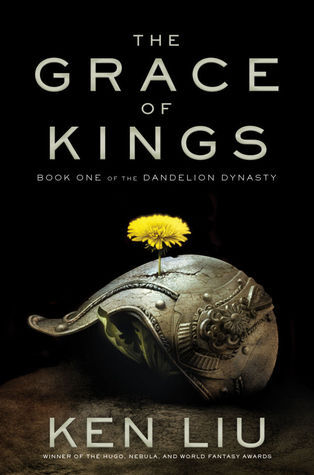
 Check Out Some Of Our Other interviews
Check Out Some Of Our Other interviews Interview; Kristyn Merbeth Author of the Nova Vita Protocol
Interview; Author Grady Hendrix
December 10, 2021
2021 Hugo Art Review – Maurizio Manzieri
 stories in photos Learn a Bit about Maurizio Manzieri
stories in photos Learn a Bit about Maurizio Manzieri “Much of your work features altered humans as the subject—some robotic, some that seem hybridized, some completely fantastical. Is there a theme at work there? What does it mean to you?
I’ve always been fantasizing about an optimistic race in a faraway galaxy where history followed a different path and everything went smoothly. It seems that people in this place survived cold wars or global warming, and slowly began to cultivate the concept of ‘Beauty.’ They became an advanced civilization mastering top-notch cosmetic surgery applied to human beings as well as robots. I’m always been fond of dystopian universes, Blade Runner, the cyberpunk movement, yet starships are not necessarily to be rusted, torn by battles, in bad shape. They could be intelligent, made of glass and titanium, pink or pure white … About mankind, beauty is an abstract concept we are used to understand and appreciate around us. Our genome has already been journeying toward this direction and beauty is just one of the many natural instruments working in an ongoing process of competition and selection…
You do a lot of commission work for book covers and magazines. How do you go about interpreting the work, choosing the elements of the story that you want to illustrate?
Usually I receive the manuscript to be illustrated from the publisher via email, then I upload it on my iPad spending a lot of time highlighting the most interesting passages, putting down ideas, sketching the first concepts on my workstation … or on paper! The world turned digital some years ago, but I like to be in touch with pencils and paper during the preparatory phase. A few strolls in the lush woods surrounding my studio help definitely! In a short time, after one or two days, I feel a click inside, a door opens in the sky and I enter the world of the writer while images and ideas keep flowing in front of my eyes from “nowhere.” I skip unessential elements, focusing on scenes conveying that feeling of sense-of-wonder which captured my soul when I was young. It’s rewarding to see an initial concept unfurling its wings, morphing in a captivating and smart solution.
Are there any subjects you’d like to take on but haven’t had the chance to yet?
Yes, everything! From a fantastic nano-tech creature hidden in a drop of rain to a sparkling metropolis large as a Jovian planet. I like to experiment and try new things. My range of interests covers anything could stimulate my thirst for knowledge, my curiosity for our terrestrial adventure. More than money, our most valuable asset is time … really hope someone may discover the secret of immortality, before I turn eighty!” ….
The interview excerpt was taken from Lightspeed Magazine and can be found here
More of Maurizio Manzieri's Work








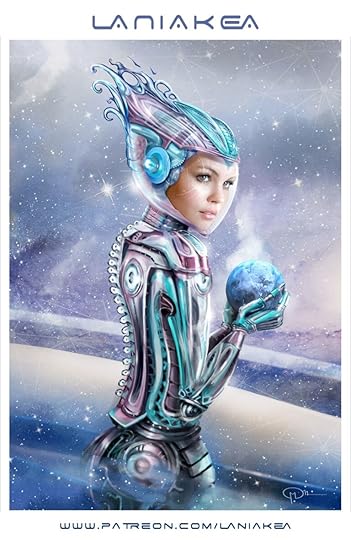




 Previous Next
Previous Next For more information please visit Mauricio Manzieri’s website. All images are the property of Mauricio Manzieri.
Check Out Some Other nominated artists2021 Hugo Art Review- John Picacio
© 2021 All Rights Reserved.
Facebook-f TwitterReview – Riot Baby by Tochi Onyebuchi

 Review Book Reviews December 10, 2021 10:00 am One Comment Racism, Magic, and the American Dream
Review Book Reviews December 10, 2021 10:00 am One Comment Racism, Magic, and the American Dream  Beth Tabler 5/5
Beth Tabler 5/5 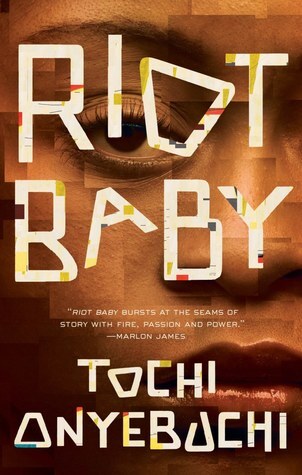 by tochi onyebuchi
by tochi onyebuchi Tochi onyebuchi, riot baby About “Riot Baby bursts at the seams of story with so much fire, passion and power that in the end it turns what we call a narrative into something different altogether.”—Marlon James“She can’t stand to have their thoughts bleed into hers, to feel their insides and to hear their prejudice and their hate and their apathy pinball behind her eyes.”―
Rooted in foundational loss and the hope that can live in anger, Riot Baby is both a global dystopian narrative an intimate family story with quietly devastating things to say about love, fury, and the black American experience.
Ella and Kev are brother and sister, both gifted with extraordinary power. Their childhoods are defined and destroyed by structural racism and brutality. Their futures might alter the world. When Kev is incarcerated for the crime of being a young black man in America, Ella—through visits both mundane and supernatural—tries to show him the way to a revolution that could burn it all down.
My ThoughtsOnyebuchi creates a dystopia portrait of modern American in Riot Baby. Kev, one of the two protagonists in Riot Baby, is born to a single mom in 1992 Los Angeles during the height of the Rodney King riots, hence the name Riot Baby. Kev was born into a time that explodes with violence in his childhood violence follows him, and as an adult, Kev is incarcerated at Rikers for eight years. Again his life swirls with anger and violence. The ironic and well-done part of Kev’s character is that even though he was born, lived, and survived through significant violence, Kev himself, does not come off as a violent person. He is a person who reacts to violence and protects himself.
The other major character and protagonist of the story is Ella, Kev’s older sister as much as Kev is mired in violence and its effects, Ella is mired in her power. She sees much more than the surface of events. She can touch the very soil of the land after some event or act of violence and feel the pain and emotions of those affected. There is a reason why she has this power, isn’t there? While Kev is in prison, Ella visits him both physically and psychically. They do not lose touch and are very close even though Kev is incarcerated.
One of the most impactful parts of this story is the dichotomy that Onyebuchi writes events with. On one side, both Kev and Ella are very gifted and powerful; they have supernatural abilities. This could have been the main focus of the story, but it isn’t. On the other side, racism and violence run rampant and have shaped their worlds in dystopias. These abilities do not save them from the vagaries of life. While each of the sides of this story is important, their powers and society in general, they are instead written to help develop the other.
In lesser hands, this story would have been challenging to make it through. It is dark and introspective, full of moments of pain and is unflinching from detailing the misery humans can rain down on others. However, in Onyebuchi’s hands, this story has a vein of hope and ends on a note of possibility for the future.
I think it will be a book that people will be talking about in the coming year and is worth a reader’s time.
Riot Baby is speculative fiction at its finest.
Check Out Some Of Our Other Reviews If You Liked This - Please Share the Love



